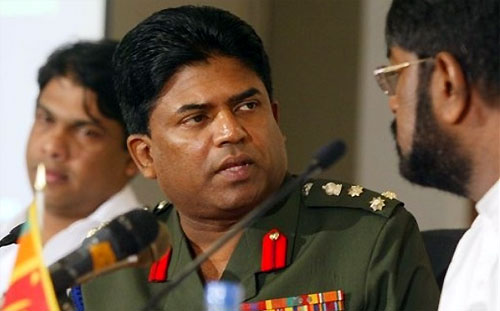|
Army to press specific charges against SF
by Shamindra Ferdinando Mar 5, 2010 | |
 Well informed sources told The Island that Fonseka would not cross-examine witnesses or call his own witnesses. That would be Fonseka’s strategy to undermine the very basis of the investigation, sources said. Military spokesman Maj. Gen. Prasad Samarasinghe told The Island that they would go ahead with the inquiry even if the former Chief of Defence Staff refused to cooperate with investigators. Non-cooperation on the part of the accused wouldn’t hinder the inquiry, he said adding that they were now in the process of gathering ‘technical evidence’ after recording statements from 31 military personnel and civilians. Deputy UNP Chairman Lakshman Seneviratne (former UNP MP) said that he had been questioned on his alleged contacts with Fonseka. Addressing public rallies in Badulla recently, he said that as a politician his right to talk with anyone could not be denied. "I may even talk with the devil or some unholy spirit or government ministers; that is my right," he said. Maj. Gen. Samarasinghe said that specific charges would be known only after the completion of the summary of evidence, though at the time of the arrest the accused had been told that he was being taken in under the Army Act 57 (1). The Army Directorate of Media yesterday (04) arranged for the media to meet Mervyn Samarakoon, retired Judge Advocate General of the armed forces to explain the circumstances under which a retired officer could be tried by a military court. Samarakoon, who had held the post from 1991 to 98, dismissed the notion that retired Generals would be involved in the process. Responding to a query by The Island, Samarakoon said in the event of the absence of officers of the same or higher rank as that of the accused, junior officers could be brought in. He said that only serving officers of the Army would be involved in a court martial. He said that three or five officers could be involved in the process and that the accused had the right to oppose a particular member or members, though it would be privilege of the court to either accept or reject it. Responding to another query by The Island, Samarakoon said the Army could move against an officer facing a conspiracy charge without being hindered by any time factor. According to him, a conspiracy charge was one of the few allegations, which could be investigated by the Army, though action had to be taken against other charges within six months from the time of committing it in the case of a retired officer. In relation to a serving officer it would be three years. The President as the Commander-in-Chief would appoint members including an additional member if the court accepted objections raised by the accused. Samarakoon said that the case against the accused should be proved beyond reasonable doubt. The benefit of the doubt would go to the accused, he said. According to him, a criminal court, too, could try the suspect on the same charge but the verdict given by the military court should be taken into consideration. Samarakoon said that the accused had the right to be represented by lawyers and also move the Court of Appeal if he didn’t accept the verdict given by the military court. He said that there was provision for the accused to move the Supreme Court against the decision of the Appeal Court. Sources said that if the military failed to prove the case against Fonseka, the latter could file a fundamental rights case against his arrest and detention at the navy headquarters. Courtesy: Island
|
|
|
| |